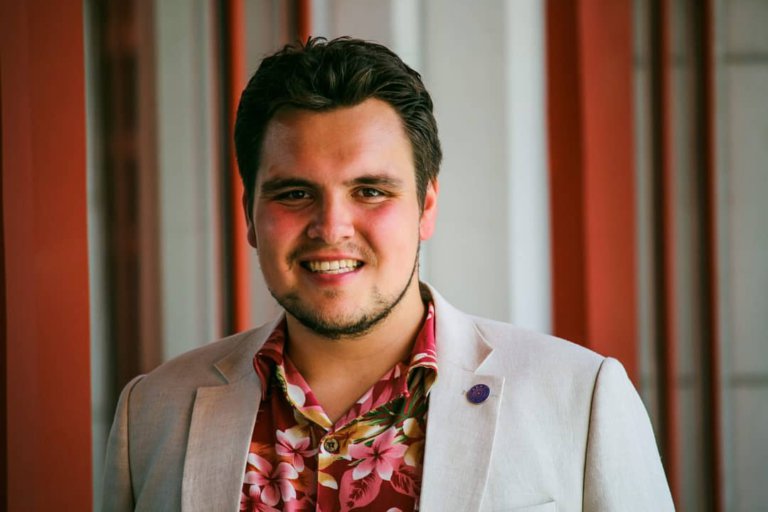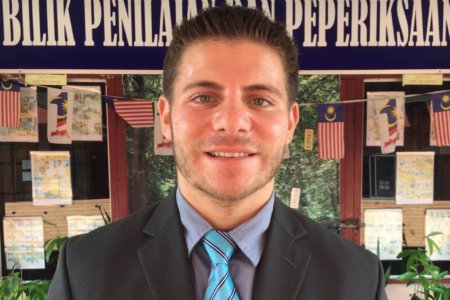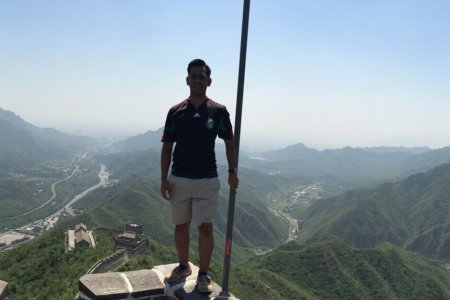
Joey Wilson is an American graduate with not only a BSc from Clemson University, but also a MMSci in Global Affairs from Tsinghua University as a Schwarzman Scholar. How did this scholar get to China? He had the opportunity to teach English at Tsinghua University through his Model UN professor.
Wilson was driven to apply to be a Schwarzman Scholar for a lot of reasons, “I thought, and still believe that China plays a very important role in global affairs,” he says. The broader region is growing rapidly.
Although Joey Wilson has a background in engineering, he thinks it’s integral for people, no matter their field, to understand the wider dynamics of business and politics. Science, business, and politics govern our modern world, so it only made absolute sense for Wilson to apply to get his degree in Global Affairs. Read more on what he has to say about his time as a Schwarzman Scholar at Tsinghua University below:
Was the application process intimidating?
It definitely was, especially the interview day. You’re put in front of a panel of six leaders of international acclaim and they ask you questions about your life, your goals, and your views on the world.

Practice, practice, practice. This Schwarzman Scholar with a degree in Global Affairs recommends for international students to immerse themselves in different cultures and try and learn the language of the country they choose to go to. Source: Joey Wilson
The conversation was so engaging that it went by so quickly, probably because of all the adrenaline. The panelists are there to get to know you and challenge you. If you can manage to relax and have fun, it’s a fantastic experience.
Walk us through your experience studying Global Affairs as a Schwarzman Scholar.
My experience was absolutely enlightening, life-changing, challenging — in a positive way — and most of all, a lot of fun. Our school community was rich and diverse with a lot of people from all over the world with a wide range of backgrounds and political beliefs.
My classmate there, Miranda Gottlieb, started something called “Steve’s Briefs” where students would give short talks every week on what they were passionate about. People were so engaged and willing to share their expertise and beliefs. The whole experience was immersive intellectually and culturally.

Wilson made the effort to spend time with his classmates in and out of school and truly enjoyed the process. Source: Joey Wilson
What challenges did you face living in Beijing and how did you overcome them?
As an international student, Beijing is not the easiest place to live. A lot of people think that you have to be a “China expert” and speak Chinese to be a Schwarzman Scholar, but that’s honestly not the case because I was neither of these things.
However, I do think it’s important to develop your language skills as there are many places outside of school where no one will speak English. I overcame the language barrier by taking every Chinese class I could and practising by using it in everyday life when possible.
Another challenge of the Schwarzman Programme is that the college can be insular or like a bit of a bubble. If you don’t actively try to get involved on campus, you will miss out on a lot of things. My advice would be to try and meet as many students as you can and get involved in organisations that pique your interest.
How have you developed your research interests as a Schwarzman Scholar, and what is the implication of this research?
I have a background in biomedical engineering and global politics. After the programme, I completed my MS in Cancer Research at Cambridge University. In preparation for that, I wanted to look at the policy side of health in China and I used lung cancer as a case study, looking at the root causes of the disease and the approaches that China took to address the health emergency that had developed.
I found that the causes were multifaceted and complex, and it became clear that political decisions were made to prioritise economic growth at the expense of people’s health. The implication of my research is that governments have to carefully examine unintended consequences of policies.
Describe how Tsinghua University’s environment, facilities, and staff have supported your studies of Global Affairs as a Schwarzman Scholar.

With a background in biomedical engineering, Wilson decided to pursue Global Affairs in China to get a broadened perspective. Source: Joey Wilson
The school environment was unparalleled. Being surrounded everyday by such driven and inspiring people really is a gamechanger. There were countless organizations and activities that really defined my time at Tsinghua.
A Chinese scholar named Roy and I would frequently organise hotpot dinners outside of the college to bring different groups together to have nice meals. There was actually a similar movement that was formalised at school called “Thoughtful Meals,” where a few scholars randomly matched people to have lunch and provided funny topics and questions.
I feel like this nature of our community really accelerated getting to know people at a deeper level and forge strong friendships. I probably had lunch with everyone in the programme at least once, and going out to Beijing was very fun.
What did you enjoy most about living in China, and how does it stand out from other countries?
Living in China was challenging but something I enjoyed. It pushed me to be independent. I went from speaking almost no Chinese to being able to get around Beijing on my own just fine, like having conversations with taxi drivers.

Joey Wilson stayed with a Chinese family for Chinese New Year, and got a whole new cultural perspective. Source: Joey Wilson
One of my favourite memories was living with a family for Chinese New Year with my friend 小龙. He made a mini documentary about it. Being with his family really showed me how welcoming and hospitable people are, it also showed me that we’re not so different when it comes to food and family values.
If I had to pick one thing that stood out for me most besides my friends, it would have to be the food. I loved trying all the different kinds of Chinese foods because there was so much diversity.
How important was it to have the experience of studying Global Affairs in China for you?
I think it was very formative for me to pursue my MMSci in Global Affairs as China is emerging as a global power especially from an economic perspective. Having first-hand experience there and understanding the dynamics that govern China will enable me to bridge the gaps for those in my network and community.
Do you have any advice for international students looking to apply in the Schwarzman Scholarship programme?
My best advice would be to enjoy the application process and be as authentic as you can. On the day of my interview, I wore a bowtie because I’m from South Carolina, and also because I never wear long ties. I think in life, the worst answer that you can get is not “No,” it’s “Maybe,” so always try for things and don’t be afraid of putting yourself out there.

A proud graduate as a Schwarzman Scholar, Wilson has plans to use all the knowledge obtained for his future research. Source: Joey Wilson
Tsinghua University has made international headlines by being in the top 20 universities of the world — why do you think this is?
Tsinghua University is top notch and I am proud to have gotten my degree in Global Affairs and am now an alumni. I feel like they really wanted to expand their international community by taking steps to provide better options for students coming from outside of China.









